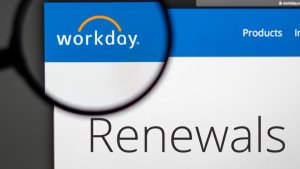- Jeff Lazarto
- Reading Time: 4 minutes

As Workday continues to grow their installed base, more customers have contracts coming up for renewal each year. As a result, we are receiving many inquiries from Workday customers looking to reduce their fees upon renewal. The drivers for fee reductions can be an overall internal cost savings initiative, lack of value realization, product adoption failure, or simply business-as-usual negotiations with general fee reduction goals.
However, customers enter these renewal negotiations with unrealistic expectations and are then disappointed with the results. Here are 3 key contributing factors:
1. Poor Precedent
The first factor is your prior deal. Many times, customers are in a situation where they have an HCM initiative with considerable time pressure to replace a legacy system. This time pressure also impacts the customer’s negotiation leverage and willingness to seek third-party assistance to understand what a highly competitive deal construct even looks like. The customer is then negotiating from a position of weakness which Workday exploits, resulting in a poorly negotiated initial deal. This initial deal becomes the precedent that greatly influences renewals and future product footprint expansion negotiations.
Keep in mind, once you’ve adopted Workday or any SaaS solution, they know the feasibility or likelihood of you not renewing is very slim and they also know that they have most of the negotiation leverage. Customers need to be realistic in evaluating their negotiation leverage prior to setting renewal negotiation expectations. This does not mean that all hope is lost, but you simply cannot ignore the impact of precedent and the negotiation leverage challenge it presents.
The best way to address this risk is to get your initial deal right, including renewal term price protections amongst other value-related commercial terms. However, if you already have a poor precedent, then you need to work a bit harder in manufacturing leverage and perhaps reducing your expectations slightly.
2. Timing and Preparation
This is the most common factor in any negotiation, but especially so with renewals. Customers often wait until 30-90 days prior to expiration before even contemplating their upcoming renewal. This is not nearly enough time to identify negotiation goals, assess and manufacture negotiation leverage, and develop an effective negotiation strategy and communication approach.
In these cases, customers find themselves in the same negotiation position as their initial deal, yet expect an improved outcome, only to be frustrated during negotiations and disappointed with the final result.
You should be assessing your current deal and renewal negotiation goals at least a year prior to expiration. This provides you with the necessary time to identify what a highly competitive deal looks like, where your current deal has opportunity for improvement, negotiation levers, and a well-designed negotiation strategy.
As the late, great UCLA basketball coach John Wooden so often told his players, “Failing to prepare is preparing to fail.” I can assure you Workday’s sales and business models are extremely well-thought out and designed to maximize their negotiation leverage and profits. You need to ensure your preparation includes the necessary market intelligence and well-designed negotiation strategy for success.
3. Negotiation Leverage
Negotiation leverage and communication execution are probably the two biggest factors in negotiation success, right after market and vendor deal intelligence. So, what are some of these negotiation levers?
- Increased spend. Workday, like any other vendor, cares about winning your business and then growing it. Every time you have a new spend scenario, whether it is adding FSEs to account for growth or product footprint expansion, you have at least some negotiation leverage, as Workday wants that new spend. And you’ll get bonus points if the product expansion displaces a Workday competitor.
- There are several ways to take advantage of timing, such as quarter-end deals or even an early renewal. You do not need to wait until your current deal expires to renew. Doing an early renewal can assist Workday in closing a deal sooner than expected, and depending on other factors, can influence Workday to provide additional concessions.
- Forecasted demand. Presenting longer-term opportunities appropriately also creates leverage. For example, if you are considering adopting other Workday solutions in the next few years, you can position that Workday’s willingness to meet your current renewal requirements will impact your willingness to adopt these Workday solutions in the future.
- Changing suppliers. Of course, the greatest leverage is the “stick” approach of considering migration to another solution, but this is not something to do lightly. You must be sure your organization is prepared to follow through on such an approach and can communicate this in a very believable manner.
For example, you may use Oracle or SAP financials and are facing an upcoming Workday HCM renewal. You could position that there is an interest in consolidating onto a common platform for HCM and Finance, and that if Workday is unwilling to meet your renewal requirements, this will influence your organization’s decision away from Workday.
Alternatively, this can also be a “carrot” approach, such that if Oracle does meet your requirements, then you will expand to their finance solution and displace Workday’s competitor. This can be followed up by requesting only a 1- or 2-year renewal, thereby increasing the likelihood of a consolidation decision and potential migration. Again, this is not an approach to be used lightly and needs to be fully vetted internally with senior leadership. However, if used properly, it can be your most effective leverage.
When thinking about leverage, just keep this in mind – your goal is to put yourself in your Workday account executive’s shoes and think about how this individual can justify to Workday’s CEO why they are recommending they meet your negotiation requests. To gain approvals, your account executive needs a very compelling story.
If Workday grants your requests, what wonderful benefits will Workday receive? Conversely, if Workday denies your requests, what terrible things will happen to Workday as a result? It’s also important that this communication occur between executives from your firm and Workday, as the messenger and receiver are just as important as the message itself.
Post a comment below, follow me on Twitter @jeffrey_lazarto, find my other UpperEdge blogs, and follow UpperEdge on Twitter and LinkedIn. Learn more about our Workday Commercial Advisory Services.
Related Blogs
Workday’s Latest AI Announcements: What You Need to Know Before Entering the Negotiation Room
The Key to Getting Your Workday Negotiations Right
Evaluating Workday’s LDP: Critical Insights for Small & Mid-Sized Businesses
About the Author

